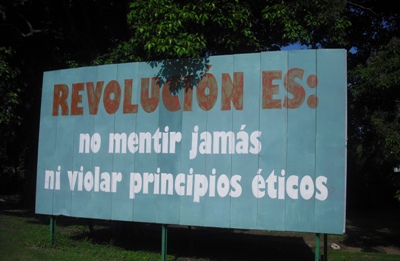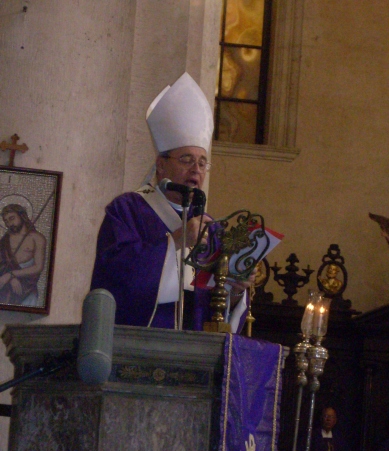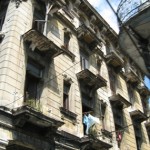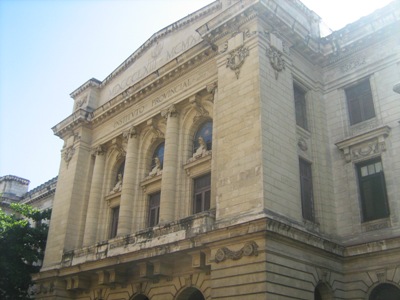Julio 27, 2009 at 18:15 · Clasificados en Sin Evasión

With the end of the 2010-2011 school year, one of the longest and most harmful of experiments of the Castro’s revolution: the Field Schools, will also have ended. About forty years of the pro-Fidel systematic and useless indoctrination exercised directly on adolescents and young people are nearing their end, primarily due to the government’s inability to sustain, both economically and ideologically, an infrastructure -almost as huge as its creator’s ego- that began to be erected since the beginnings of the decade of the 70’s for the formation of the new man.
The moment deserves a memory recall, the one we must maintain fresh, not to kindle hatred, but to safeguard future experiences from satanic temptations. I still remember the first time I heard talk of the aberration. I was in the seventh grade then, in “Founders of the Future” High School (which some of the funnier students nicknamed “Fugitives of the Future”), located in the area of the Plaza de Armas in Old Havana, a building that once housed the headquarters of the US Embassy in the Republican period, and today is the humble Museum of Natural Sciences. It was just during that school year (1971-1972) when the Grade Principal informed us in a newspaper that a new and advantageous system for secondary studies would be created in newly constructed boarding schools located in the countryside. There, students would “have every comfort and conditions in order to study, there would be schedules for self study, good food, beautiful uniforms, transportation, leisure time schedules, a formidable material base of studies and very qualified teachers”, he added that in these schools, studies and agricultural work would be combined, in order to shape the type of men Ché wanted, without the weaknesses found at home and the pampering of parents. There, “we would mature” and would “learn how to better serve the revolution”. This last declaration turned out to be the only truth.
It’s possible that few people will remember this, but the first “laboratory” of the diabolical experiment was the “Vanguards of Havana” ESBEC, built on the Isle of Pines and nourished the aforementioned school year with students from my secondary school. Some kind of rebel angel who has made me wary has always lived inside of me: I never wanted a scholarship, I never gave in to the many instances when they tried to encourage me to enter the game; I didn’t even agree to be one of the flaming “elected ones” of the Lenin Vocational when, in ninth grade, the guidance counselor very happily placed a blank form for me on my desk. I will never forget her expression of astonishment when I politely rejected her offering, which, to date, I consider well-intentioned: I was a good student, and she wanted to “reward me” by granting me a sort of world visa for Castro’s newly anointed. In spite of my naively believing in “this”, I wasn’t ready to submit myself to a regime of seclusion that imposed schedules and promiscuity away from my folks. I have always been a family individual.
After that first one, the ESBEC (secondary schools) invaded the countryside like marabou. Shortly after, the IPUEC (pre-universitary schools) followed. In a short time, they multiplied and, also in a short time, the fruits of the premature separation of adolescents from their homes began to be harvested: the promiscuous cohabitating far from the familial control and the lack of responsibility and inexperience of many of the young teachers, trained in the first pedagogic detachments to cover teaching vacancies in these schools, led inexorably to the loss of traditional moral values instilled within the family. Coarse egalitarianism that mixed youngsters of the most diverse formations –and malformations- fostered the spread of vulgarity, undermining the parents’ authority role, premature sexual relations among students as well as between students and certain teachers, pregnancies of many students, abortions, and the proliferation of sexually transmitted diseases. Other dismal tendencies emerged and spread quickly: blackmail (good grades in exchange for the sexual favors of young women favored by the teachers), abuses and humiliation towards the weakest, fatal accidents due to students’ escapes and other lacks of discipline, and even cases of adolescent suicides that –of course- have never been officially disclosed. These were some of the results in the short run.
The fragmenting of the family came in the medium and long terms, the substitution of its functions by the State, the indoctrination, the standarization of immorality, the loss of quality of education; in short, a cultural damage that could almost be considered irreversible. We don’t need to mention the economic losses that such an “educational” system implies; beyond the enormous exceptions involving the creation and maintenance of the whole infrastructure and the “free” condition of it, the damages suffered by agriculture “worked” by students are incalculable.
The Field Schools are one of the most diabolical monstrosities of F. Castro and of this system, but it is important to also remember that in those early years, when the experiment began and when it was still a voluntary option, there were no groups of parents who publicly and civicly raised their voices to warn about the consequences of such plans. Perhaps the most proactive ones were content with preventing their children from joining the new boarding centers, but it would result in a complicit silence: several years later, when the government tried to hide the failure by returning the secondary studies to the external system, high school studies under the boarding system would take on a mandatory character. It could be argued, however, that in the decade of the 70’s and in the next decade there were thousands of parents who irresponsibly gave their children up as guinea pigs before the altar of the revolution by allowing, and even encouraging, their admittance to the scholarships.
Today –and as another sign of the slow but steady crumbling of the regime- the end of that nightmare, generated from the talent of the great National Big Idea looms- but long years and extreme effort will be required to recover from the greatest of destructions achieved by the Cuban revolution: the deconstruction of the family starting from the systematic misshaping of several generations of our children.

 Last Friday, July 17th Havana Cathedral was the scene of the farewell to Merino Mariano Arroyo, a priest whose body had been found in the early hours of Monday, July 13th brutally murdered in his Regla church. He had been visibly tortured. The ceremony of the Eucharist was celebrated before a shocked crowd that filled the vast nave of the old Cathedral. I was there, not driven by religious sentiments I have never professed to have, but for the need to express myself civically by my respectful presence against such abominable acts. I can’t deny that my interest to find out what the highest ecclesiastic Cuban authority Cardinal Jaime Ortega would say to the heavy concentration of faithful gathered there, before the coffin of the martyred priest also stirred me.
Last Friday, July 17th Havana Cathedral was the scene of the farewell to Merino Mariano Arroyo, a priest whose body had been found in the early hours of Monday, July 13th brutally murdered in his Regla church. He had been visibly tortured. The ceremony of the Eucharist was celebrated before a shocked crowd that filled the vast nave of the old Cathedral. I was there, not driven by religious sentiments I have never professed to have, but for the need to express myself civically by my respectful presence against such abominable acts. I can’t deny that my interest to find out what the highest ecclesiastic Cuban authority Cardinal Jaime Ortega would say to the heavy concentration of faithful gathered there, before the coffin of the martyred priest also stirred me.










